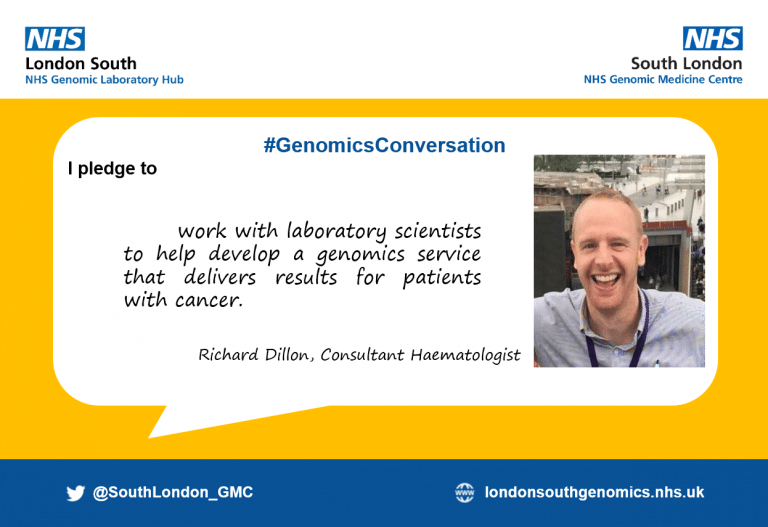Spotlight on...Haematology #GenomicsConversation
Haematology and Genomics
This week is the national #GenomicsConversation week of action, part of a campaign launched by the Genomics Education Programme (GEP) to dispel the myths, explain the facts and outline the clinical impact of genomics. At South East we will be sharing a series of interviews with different health professionals where they discuss how genomics is changing how they care for their patients.
Second in our Spotlight on Genomics series, we interviewed Dr Richard Dillon, a consultant haematologist at Guy’s Hospital, on how he uses Genomics in treating patients with acute leukaemia.

Richard (third from the left) with colleagues outside Guy’s Hospital, London.
Do you use genomics in your clinical practice now? At the moment, our patients get cytogenetic testing and are screened for a limited panel of mutations. We will soon have access to whole genome sequencing for all of our patients, which is really exciting because it potentially opens up new treatment options for patients. I was recently involved in caring for a teenager with acute lymphoblastic leukaemia (ALL) which was resistant to standard chemotherapy. We did whole transcriptome sequencing on her sample and found a hidden fusion gene which predicts sensitivity to imatinib (a drug which turns off certain cancer-related proteins). She started this new treatment and has now gone into remission.
What most excites you about genomics? I am excited by the possibility to better allocate patients to the most effective treatment for their individual disease. I am also very excited about the possibilities that routine WGS provides to better understand resistance to therapy. New drugs are now becoming available for AML however not all patients respond to these. Performing genomic analysis on patients who do or don’t respond to these treatments should identify the mechanisms of resistance which will hopefully lead to more successful treatments being developed in the future.
With the roll-out of the new Genomic Medicine Service this year, whole genome sequencing (WGS) will for the first time be available as an NHS test and become a routine part of medical care for certain rare diseases and cancers. How do you envisage implementing this within your service? We plan to perform WGS on all eligible patients at the time of diagnosis and then again if they relapse.
What do you feel are the benefits of genomic medicine for your patients? Allocating treatment, including new targeted therapies, more precisely will hopefully improve their chance of survival and quality of life.
What do you feel are the limitations of using genomic testing as part of routine clinical practice? Sequencing the DNA alone does not provide a complete picture of a patient’s disease: DNA sequence variation alone does not explain all of the observed variation in clinical behaviour. I hope that in the future we will be able to routinely sequence RNA as well as DNA.
Do you have any suggestions on how we can raise awareness of genomics amongst your colleagues? I suggest a series of educational events that are open to all students and members of staff.

Here’s Richard’s #GenomicsConversation week pledge to support the South East GLH in providing genomic testing.
Do you have any suggestions on how we can raise public awareness of genomics? I think people would be really interested in finding out more about this. Maybe a TV programme?
What does the future hold for genomics in your field? After a few years, tens of thousands of patients with leukaemia will have had their genomes sequenced, generating a huge amount of data that can then be linked with outcomes from treatment including clinical trials. This will be a globally unique resource and I hope it will provide valuable insights into better ways to treat this disease.
